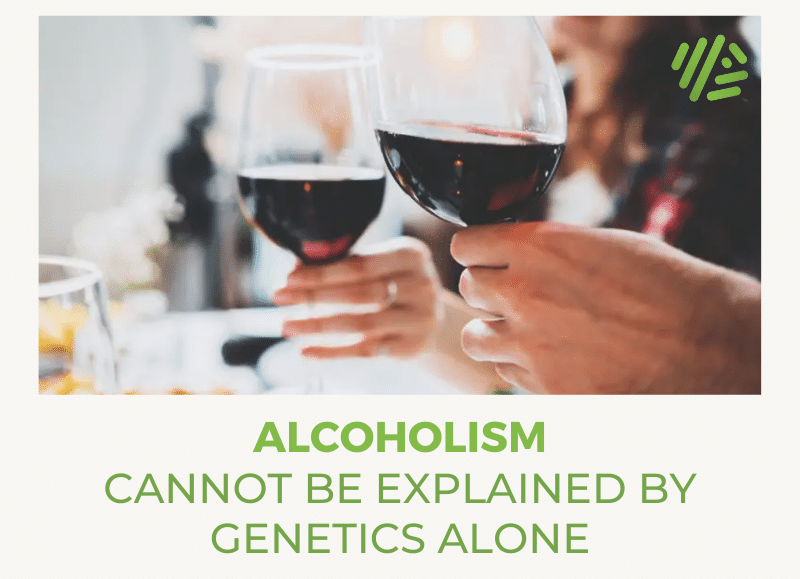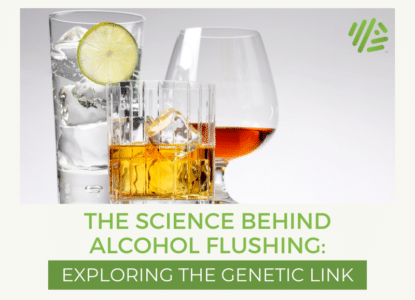Only 5-10% of the Risk for Alcoholism Can Be Explained by Genetics
Article at a Glance
- Family-based studies have shown the highest heritability of up to 60% for alcoholism.
- In candidate gene studies, the strongest associations were for ADH and ALDH genes regulating alcohol metabolism. Those who metabolize alcohol poorly tend to avoid drinking and are less likely to develop alcoholism.
- More recently, large-scale GWAS studies show only 5-10% heritability for alcoholism, which means a lot is still undiscovered, and more research is needed.
- Genetics represents just one piece of the intricate puzzle that is alcoholism.
Genes Mentioned

Contents
Alcohol Use Disorder (AUD), commonly known as alcoholism, is a pervasive global health concern. Individuals grappling with AUD often find themselves locked in a relentless battle against excessive and harmful alcohol consumption, impacting not only their own lives but also those of their loved ones and society at large. Despite its widespread prevalence, AUD remains an under-diagnosed and under-treated mental health condition.
AUD is a serious problem. Is it inherited?
Defining Alcoholism: The Diagnostic Puzzle
- Genetic studies often rely on a formal diagnosis called Alcohol Dependence, as outlined in the Diagnostic and Statistical Manual of Mental Disorders, Fourth Edition (DSM-IV).
- According to this diagnostic framework, an individual is classified as having AUD when they meet three or more out of seven specific criteria indicative of severe alcohol-related problems.
- Researchers also employ tools like the AUDIT scale to classify alcohol-related issues.
- The AUDIT scale comes in various forms, with the shorter AUDIT-C consisting of three questions that assess how often and how much someone drinks, as well as episodes of binge drinking.
Early Evidence for Alcoholism Being Hereditary
The genetic exploration of AUD is rooted in a long history of observing that alcohol-related problems tend to run in families.
Early research uncovered a significant increase in the risk of AUD among the relatives of individuals with alcohol issues, often three to four times higher. 1 Subsequent adoption studies further cemented this notion, revealing a heightened risk of AUD in the sons of alcoholics, even when raised by non-alcoholic families. 2
Another avenue of inquiry involved the use of twins. The consistent finding from twin studies was that genetics played a substantial role in alcoholism, explaining roughly 60% of the risk. 3 4
See also: Why we tend to choose partners based on drinking habits
Poor Alcohol Metabolism is the Biggest Genetic Factor in Predicting Alcoholism
Genetic linkage studies explored the inheritance of AUD within extensive family trees by investigating whether specific genetic markers consistently correlated with the disorder among family members. 5
Poor alcohol metabolism, as is seen in many East Asian populations with alcohol flushing, seemingly conferred protection against alcohol dependence.
Numerous genes were implicated in AUD, covering critical brain signaling systems like GABA, glutamate, serotonin, dopamine, and acetylcholine.
Genes linked to neuropeptide signaling (such as NPY and CRH) and various cellular functions (like MPDZ and RSU1) also played a role. 6 7
However, the most robust genetic associations were observed in functional SNPs within genes like alcohol dehydrogenase (ADH) and aldehyde dehydrogenase (ALDH), which play a major role in alcohol metabolism in the liver. 8 9
Alcohol metabolism involves a two-step process: first, the enzyme ADH turns ethanol into acetaldehyde, and then ALDH further converts acetaldehyde into acetate. 8 9 10
Those that do a poor job metabolizing alcohol genetically are at the lowest risk for developing alcoholism because drinking is an unpleasant experience for these people.
Poor alcohol metabolism leads to build up of acetaldehyde. This causes symptoms like flushing (reddening of the skin), headache, sweating, fast heart rate, nausea, and vomiting. 11 These symptoms act as a natural deterrent against excessive drinking and can help protect against the development of AUDs.
In contrast to findings from family studies, large scale GWAS studies have so far been able to account for approximately 5-10% of the total heritability of AUD. 12
The Genetics of Alcoholism is Complex
Despite these remarkable genetic discoveries, it’s crucial to recognize that genetics represents just one piece of the intricate puzzle that is alcoholism.
The most reliable genetic markers related to alcoholism can predict who is unlikely to develop an AUD, but less so who is at greater risk to become addicted to alcohol.
Environmental factors, such as upbringing, social influences, access to alcohol, and stress, also play pivotal roles in the development of AUD. The interplay between genetics and the environment is a dynamic area of ongoing research, as scientists strive to unravel the multifaceted factors contributing to alcoholism.
In conclusion, understanding the genetics of alcoholism is a complex endeavor. While genes indeed play a significant role, they do not act in isolation. Instead, they interact with a myriad of environmental factors, shaping the trajectory of this complex and challenging condition.
As researchers continue to decode the genetic and environmental components of alcoholism, we move closer to a more comprehensive understanding and more effective interventions for this critical public health issue.



